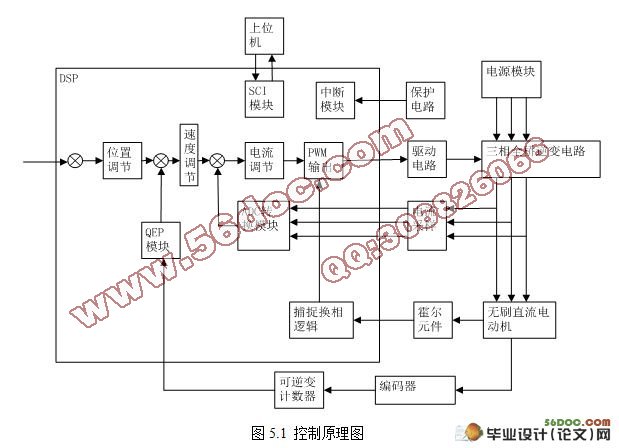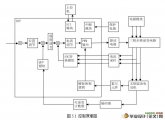基于DSP电机控制方法研究
来源:56doc.com 资料编号:5D9167 资料等级:★★★★★ %E8%B5%84%E6%96%99%E7%BC%96%E5%8F%B7%EF%BC%9A5D9167
资料以网页介绍的为准,下载后不会有水印.资料仅供学习参考之用. 密 保 惠 帮助
资料介绍
基于DSP电机控制方法研究(含任务书,开题报告,外文翻译,毕业论文说明书19000字,进度检查表)
摘要
随着DSP技术的发展,DSP的应用范围越来越广,并且伴随着数字化的发展,对电机的控制的精度要求越来越高,DSP数字化处理能力也得到了质的飞跃。所以学会应用DSP时非常重要的。
本文详细讨论了无刷直流伺服电机,并推述星形接法的数学模型,并设计了数字控制无刷直流伺服电机总体方案,本文采用PID控制方法来控制电机,详细介绍了PID控制算法。
对DSP种类进行了简单的介绍,并选择以TMS320F2812为基准构建硬件平台,设计了DSP供电电源设计,驱动电路的设计,PWM光电耦合隔离电路的设计,电流的采样电路的设计,对DSP进行保护电路的保护电路的设计等。
在CCS环境下,对程序进行编辑,编写PID控制算法程序,对系统的初始化,编码器模块初始化,捕捉模块的初始化,SCI模块的初始化,以及对数字滤波进行编程。
关键词:DSP;CCS;PWM;无刷直流伺服电机
Abstract
With the development of DSP technology, DSP application scope is more and more wide. With the development of digital control is higher and higher, The ability of digital handle has own a qualitative leap.So learn to apply DSP is very important.
This paper discusses the brushless DC servo motor in detail .The paper describes the mathematical model of the star connection. I designed the general planning of digital control the brushless DC servo motor, this paper adopts the PID control method to control the motor and introduces the PID control in detail.
First the article introduces the DSP types simply and select the hardware platform what is based on TMS320F2812 .I designed the DSP power supply. I designed the drive circuit and the PWM photoelectric coupling isolation circuit.I also designed the sampling circuit and the current of protection .At last I designed the protection circuit.
In the CCS environment, I edited the program and written in PID control algorithm.I also completed the initialization of system,the initialization of encoder module , the initialization of capture module ,the initialization of SCI module , and programming of the digital filter.
Keywords: DSP; CCS; PWM; brushless DC servo motor
研究内容
① 熟悉DSP的发展历程。
② 熟练掌握DSP的原理以及硬件结构。
③ 熟练掌握DSP根据设计要求设计相应的外围电路。
④ 掌握DSP集成开发环境CCS。
⑤ 能够熟练使用C语言进行编程。
⑥ 熟练使用CCS开发软件。
拟采取的研究方法、技术路线、实验方案及可行性分析
(1)实验方案
采用TI公司的2000系列,采用TMS320F2812来实时控制无刷直流伺服电机
(2)研究方法
用CCS软件仿真和CCS编程

目 录
摘要 III
Abstract IV
目 录 V
1 绪论 1
1.1 本课题的研究内容和意义 1
1.2 国内外的发展概况 1
1.3 本课题应达到的要求 2
2 电机的选择及其结构 3
2.1 步进电机 3
2.3 选择电机 5
2.4 本章小结 5
3 无刷直流电机的工作原理及数学模型 6
3.1 无刷直流电动机的结构 6
3.2 无刷直流伺服电动机的位置检测装置 6
3.2.1 霍尔传感器 7
3.2.2 定子绕组连接方式 7
3.2.3 开关管控制方法 9
3.3 无刷直流电机的暂态数学模型 10
3.4 本章小结 11
4 控制方案的总体设计 12
4.1 控制方案的框图简介 12
4.2 无刷直流伺服电动机实现控制的方法 12
4.2.1 数字PID控制算法 13
4.2.2 数字控制器设计的方法 14
4.2.3 工程设计调节器的步骤 14
4.3 PWM信号产生技术 14
4.4 编码器 15
4.5 电机相电流检测技术 17
4.6 本章小结 17
5 DSP的选择及相应的硬件设计 18
5.1 DSP芯片TMS320F2812的特点 18
5.2 控制硬件的设计 19
5.3 DSP外围电路的设计 19
5.3.1 电源的设计 19
5.3.2 DSP的晶体振荡器接口电路 20
5.3.3 时钟电路的设计 20
5.3.4 JTAG电路的设计 21
5.3.5 异步串行接口(SCI)硬件的设计 21
5.3.6 CAN总线接口硬件设计 22
5.4 功率驱动逆变电路的设计 22
5.4.1 IR2130芯片具有以下一些特点 22
5.4.2 IR2130结构原理图 23
5.5 电机驱动的设计 24
5.5.1 自举电容的选择和计算 25
5.5.2 PWM驱动信号隔离电路 25
5.6 霍尔传感器信号电路 27
5.7 正交编码脉冲信号电路 28
5.8 控制器保护电路设计 28
5.9 本章小结 30
6 控制系统的设计 31
6.1 控制系统设计的基本原则 31
6.2 软件的设计 31
6.3 DSP集成开发环境CCS 31
6.4 主程序的设计 32
6.4.1 系统初始化模块 37
6.4.2 事件管理器模块 38
6.4.3 捕捉模块(cap) 39
6.4.4 QEP正交编码器脉冲电路 40
6.4.5 ADC模数转换模块 41
6.4.6 SCI模块 42
6.4.7 PID算法流程图如所示 44
6.4.8 电流采样数字滤波 45
6.5 本章小结 46
7 结论与展望 47
7.1 结论 47
7.2不足之处及未来展望 47
致 谢 48
参考文献 49
|



